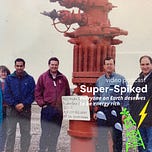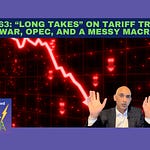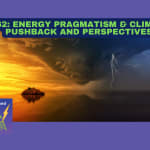Note: this is republication in order to upload the audio to Apple Podcasts and Spotify.
WATCH the video on YouTube by clicking the RED button above.
LISTEN to audio only via the Substack player by clicking the BLUEbutton above.
STREAM audio only on Apple Podcasts, Spotify, or your favorite podcast player app.
DOWNLOAD a pdf of the slide deck by clicking the blue Download button below.
We return to our sub-theme of "Goodbye Europe, Hello Rest of World" sparked by Barclay's updated Climate Change Statement (here and here), evidence of structural de-industrialization in Germany, and our recent analysis on Norway's resilient overall oil demand despite gasoline erosion due to its electric vehicle (EV) ramp.
With Europe fading as a core driver of global GDP growth, our macro focus is on how key population centers in Asia, in particular China (1.4 billion people), India (1.4 billion people), and the rest of southeast Asia (1.3 billion people) will meet their massive unmet energy needs. Climate policies being pursued in Western Europe, the United States, and Canada that disproportionately and perplexingly negatively impact traditional energy companies in their home regions is one of the key contributing factors to the messy energy transition era. For developing Asia, it remains an open question as to whether American and Canadian oil and natural gas (via LNG) will be part of the solution or will they instead need to rely on the Middle East and Russia.
Barclay's updated Climate Change Statement that promises to stop financing new oil and gas fields and infrastructure expansion is the latest example of a western-world financial institution succumbing to pressure from "climate only" ideologues. It is deeply unfortunate. Germany's ill-advised energy and climate policies are undoubtedly a major contributor to its relatively high power prices and undeniable signs of structural de-industrialization. Norway's rapid EV ramp shows how hard it is to kill overall oil demand—a fact "net zero by 2050" scenarios bizarrely ignore. Ill-advised energy and climate policies from European governments and, increasingly, financial institutions like Munich Re and Barclays (among many others) is contributing heavily to what we call a messy energy transition era—our motivation for creating Super-Spiked.
🔔 4 Ways to Subscribe
All Content: If you subscribe to Super-Spiked via email, you will receive all content to your inbox and it is also all on the Super-Spiked website. I have been aiming to publish about once a week, usually on Saturday.
Veriten: You can now also subscribe to Super-Spiked content via the Veriten website (here) and also receive Veriten’s flagship COBT video podcast.
YouTube channel for video only: You can subscribe directly to the video feed of
Super-Spiked Videopods on my YouTube channel Super-Spiked by Arjun Murti.
Apple Podcasts, Spotify for audio only. You can subscribe directly to the audio only feed on Apple Podcasts, Spotify or your favorite podcast player app. The podcast is simply the audio for the YouTube videos.
⚖️Disclaimer
I certify that these are my personal, strongly held views at the time of this post. My views are my own and not attributable to any affiliation, past or present. This is not an investment newsletter and there is no financial advice explicitly or implicitly provided here. My views can and will change in the future as warranted by updated analyses and developments. Some of my comments are made in jest for entertainment purposes; I sincerely mean no offense to anyone that takes issue.
📜 Credits
Intro & Outro music: Wolf Hoffman: Concerto for 2 Cellos in G Minor, Rv 531: I. Allegro Moderato.
This episode of Super-Spiked Videopods was edited and produced by Veriten Productions.













Share this post